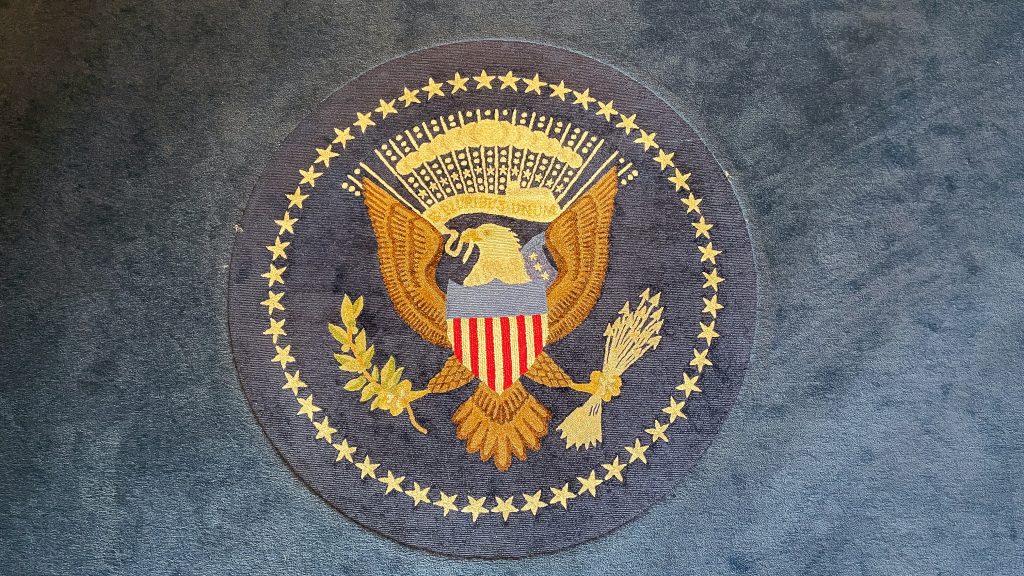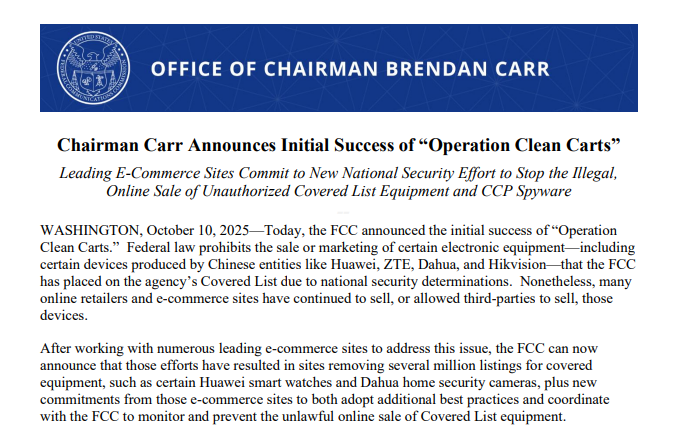
In a significant move impacting global e-commerce, the U.S. Federal Communications Commission (FCC) has directed major American online retailers, including Amazon, Walmart, and eBay, to remove millions of electronic products manufactured by Chinese companies from their platforms. The action, framed as part of the FCC's broader efforts to protect national security, targets devices deemed to pose unacceptable risks.

According to the FCC, the basis for the mandatory delisting stems from "national security considerations." The agency asserts that the targeted products fall primarily into two categories:
- Products on the U.S. "Covered List": This includes devices manufactured by companies such as Huawei, ZTE, Hikvision, and Dahua Technology. Specific items targeted include home security cameras, smartwatches, wireless routers, and other electronic products deemed potentially capable of surveillance or communication interference.
- Electronic devices lacking FCC authorization: This broader category encompasses various consumer electronics like Wi-Fi security cameras, children's GPS tracking watches, and smart door locks that have not received the necessary FCC approval for sale in the U.S.
The FCC further stated that some devices may pose risks such as "surveillance of users or disruption of communication networks," though specific evidence supporting these allegations was not provided alongside the announcement.
Major e-commerce platforms responded swiftly to the FCC's directive, confirming they have largely completed the removal of the specified products. They are now reportedly implementing new review processes under FCC supervision to prevent these items from being relisted.
Uneven Impact on Sellers
The execution of the delisting appears varied. Products from major, well-known Chinese brands subject to existing U.S. restrictions have largely disappeared from search results on platforms like Amazon US. However, some less prominent brands sold by small and medium-sized sellers remain partially available. These sellers have reportedly received notifications requiring them to verify their product certifications and compliance within 15 days, facing account restrictions if they fail to remove non-compliant items.
Lab Certifications Revoked
Compounding the challenge for manufacturers, the FCC has simultaneously revoked the Mutual Recognition Agreement (MRA) qualifications for several China-based testing laboratories. This move effectively blocks the primary channel for certifying new electronic devices for the U.S. market, and complicates re-certification efforts for existing products.
Even if a product itself is compliant and was previously authorized, the loss of these testing pathways could lead to significantly higher certification costs or force products off the market entirely due to an inability to get tested and approved.
Escalating Regulatory Pressure & Upcoming Vote
This mass delisting represents a significant escalation of FCC regulatory actions targeting Chinese technology. Previous measures include:
- 2019 National Defense Authorization Act (NDAA): Restricted U.S. federal agencies from purchasing equipment from specific Chinese companies (like Huawei and ZTE).
- 2022 Secure Equipment Act: Led the FCC to stop issuing new equipment authorizations for companies on its "Covered List" (including Huawei, ZTE, Hikvision, Dahua, and Hytera).
The current action moves beyond preventing new authorizations to actively removing millions of existing products from the consumer market.
Furthermore, the FCC's oversight appears set to tighten even further. FCC Commissioner Brendan Carr plans to bring a proposal to a vote on October 28th that would dramatically expand restrictions. If adopted, this proposal could:
- Prohibit FCC authorization for any device containing components manufactured by companies on the Covered List, regardless of the final product's brand.
- Potentially revoke existing authorizations for equipment already in the market if deemed a national security risk or found to contain prohibited components.
Sellers operating in the U.S. market, particularly those dealing in electronics, are advised to closely monitor the outcome of the FCC's October 28th vote. Accelerating compliance checks, ensuring proper certification through accredited labs (if available), and managing inventory turnover are now critical priorities.
This latest action extends the U.S. government's focus beyond telecommunications and semiconductors into the realm of consumer electronics. The full scale and duration of this "clean-up" remain uncertain, but it signals a new era of risk for sellers, extending beyond typical platform policies and market competition into the complex domains of geopolitical regulation, product compliance, and supply chain transparency. Any component linked to a restricted entity could become grounds for removal, demanding unprecedented diligence from sellers sourcing products globally.








